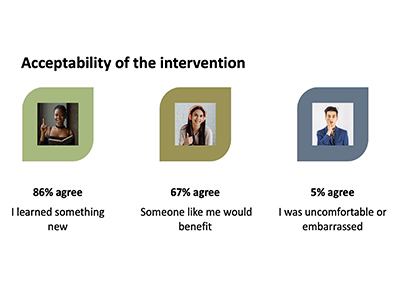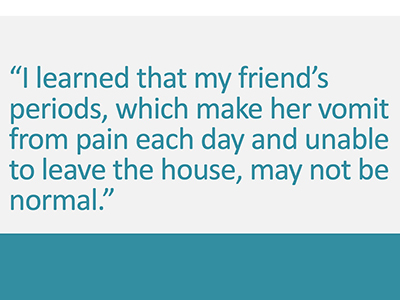
An educational program led to greater knowledge about endometriosis and comfort discussing menstrual health among adolescents.
Conducted in collaboration with members of the community, new research has linked an education program for school-aged adolescents to improved knowledge and attitudes about menstrual health and endometriosis, which affects 10 per cent of women and girls of reproductive age globally.
Endometriosis is a chronic disease that can be associated with life-altering pain. Often attached to painful periods, endometriosis is also connected with chronic pelvic pain, bloating, nausea and fatigue, as well as pain during sexual intercourse, bowel movements and/or urination. In some instances, it can trigger depression or anxiety, and even lead to infertility.

Medical understanding of endometriosis, along with diagnostics, is still emerging, with poor symptom recognition and stigma leading to many women and girls not accessing or receiving necessary care, says Dr. Paul Yong, a Vancouver Coastal Health Research Institute researcher.
“Despite the significant burden of unmanaged endometriosis, the average time to diagnosis in Canada is at least five years, with an annual associated cost of approximately $2.5 billion.”
Greater public knowledge and understanding of endometriosis through education have the potential to ensure that more adults and adolescents experiencing symptoms receive timely medical attention, Yong adds. However, the education system in British Columbia and throughout Canada has historically focused sexual health curricula on pregnancy and sexually transmitted infection prevention.
“Early endometriosis diagnosis is important to prevent the risk of developing chronic pain or reproductive issues later in life.”
“Adolescents, in particular, are often not aware of what endometriosis is,” notes Yong. “Up until recently, endometriosis required a surgical diagnosis, but now guidelines note that endometriosis can also be diagnosed by symptoms and a physical examination, and by imaging with ultrasound or MRI diagnostic tests, in some cases.”
Significant results after only 60 minutes of educational information
The study led by Yong and PhD student Kate Wahl — published in the Journal of Obstetrics and Gynaecology Canada — delivered a virtual, 60-minute menstrual health and endometriosis education program to Vancouver-based school-aged students of all genders in grades eight to 12. Program design and implementation was done in consultation with a patient research advisory board consisting of community members with lived experience of endometriosis and women’s health issues.
The Menstrual Health and Endometriosis (ME) education program used in the study was licensed from Endometriosis New Zealand and adapted to a Canadian context. No Canadian educational program for school-aged adolescents existed at the time, although new educational materials and programming are now available through The Endometriosis Network Canada and other organizations.

Yong and Wahl’s randomized controlled trial involved two randomly selected early intervention classes and two late intervention classes. All participants completed a baseline questionnaire that asked them about their knowledge and attitudes towards endometriosis. The early intervention classes received the education program before taking a follow-up questionnaire at around four weeks after completing the program. The control classes took the follow-up questionnaire before participating in the education program.
“If left untreated, the symptoms of endometriosis can result in frequent absences from school or work, and lead to negative psychological and social consequences.”
Confidence in endometriosis knowledge among the 26 adolescents in the early intervention classes increased from 19 per cent prior to the education program to 48 per cent after the education program. In comparison, confidence in endometriosis knowledge among the 21 students in the late intervention classes grew from 15 per cent to 24 per cent.

Prioritization of menstrual health knowledge also increased in the early intervention classes, while it decreased among late intervention class participants. Likewise, participants in the early intervention group felt more comfortable discussing their menstrual health with trusted individuals — such as their parents, friends, doctors, teachers and partners — after participating in the education program. Conversely, adolescents in the later intervention group felt less comfortable.

“One of the advantages of this study is that it involved students of all genders, including girls and boys,” notes Wahl. “It is important to get the message out to all individuals, as endometriosis not only impacts women, girls, transgender, non-binary and Two-Spirit individuals, it also impacts their families, friends, coworkers and other people within their social circles.”


